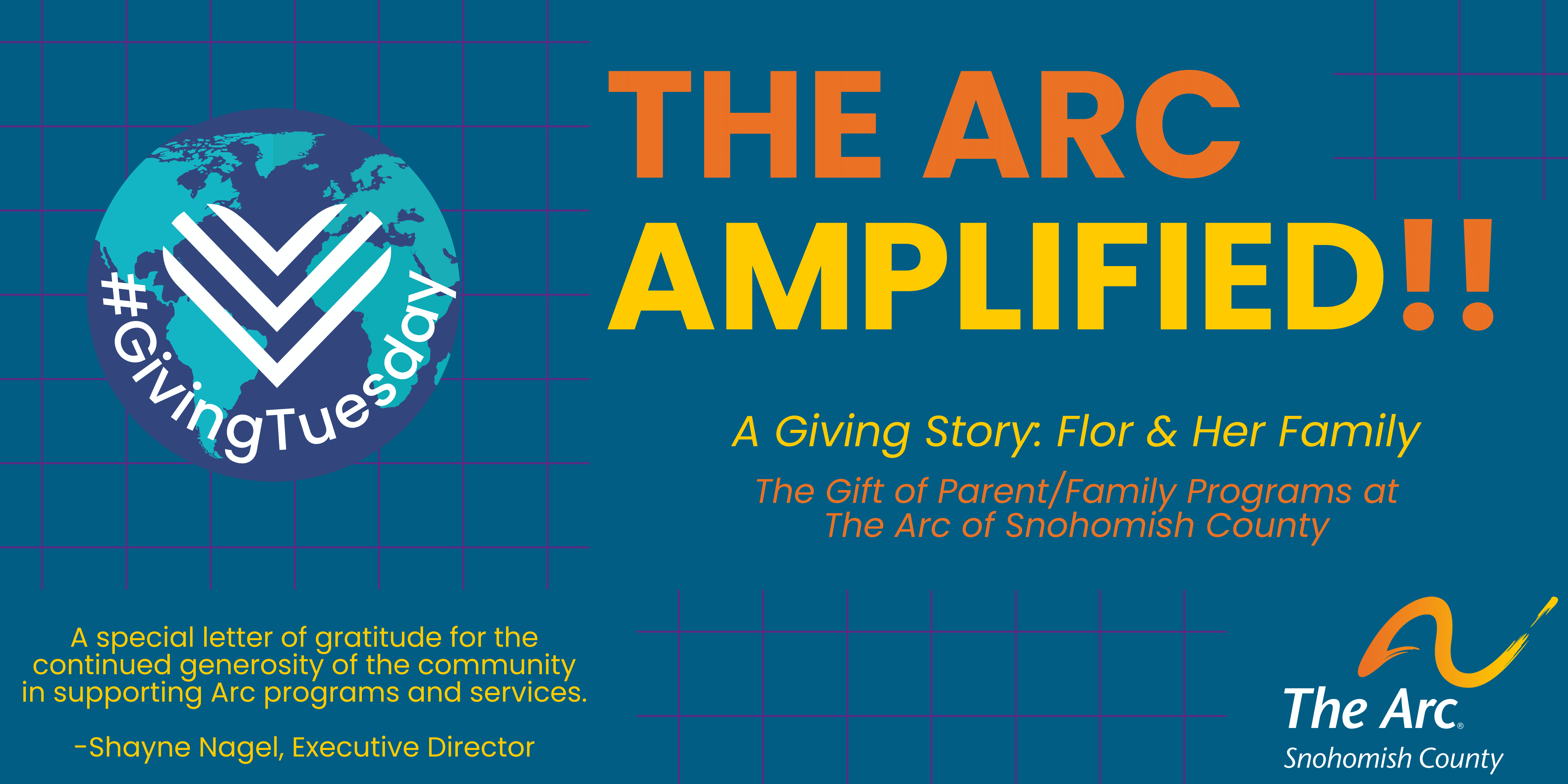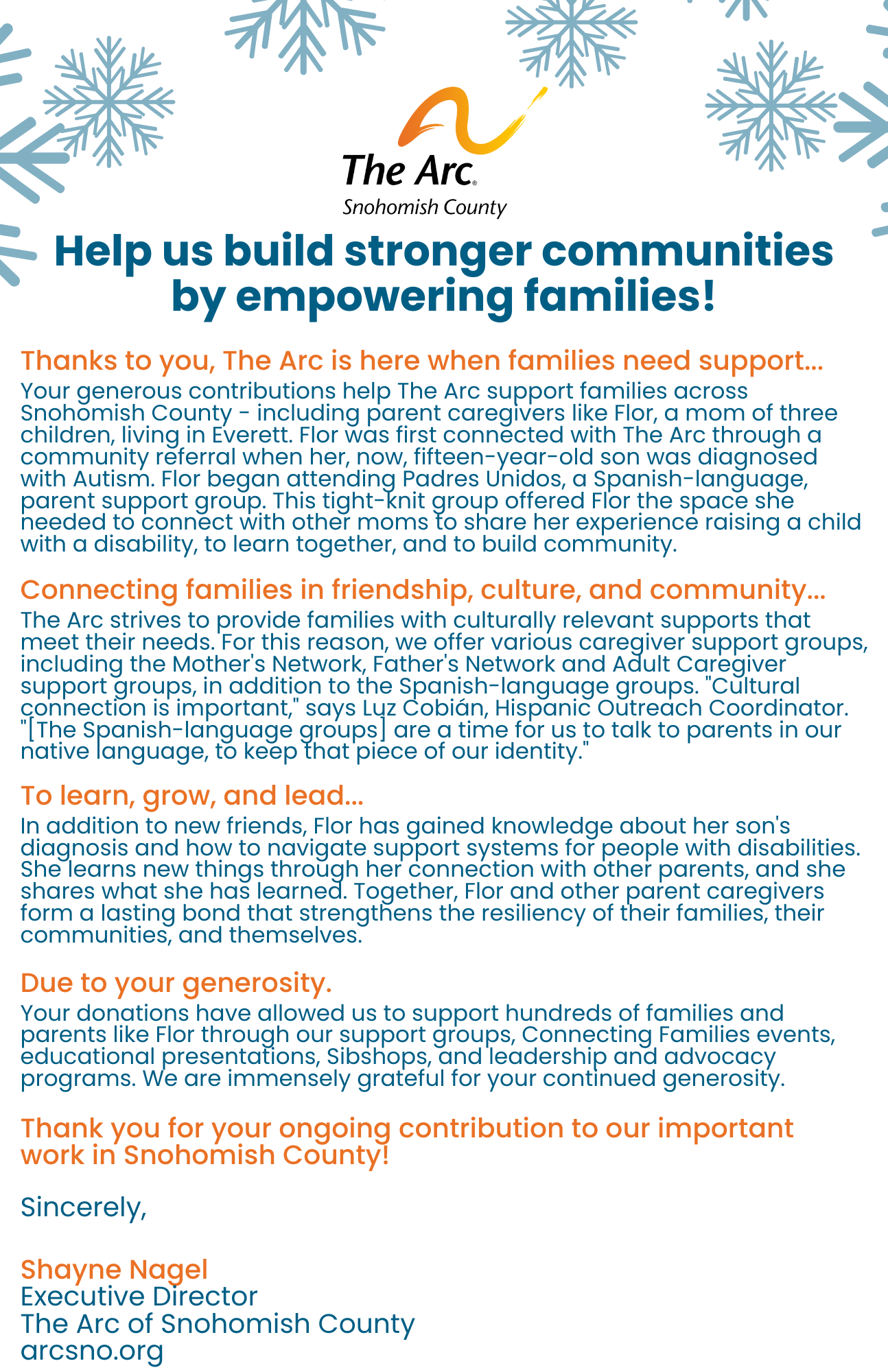A source for sharing stories of inclusion and belonging, bold activism and local change-makers in action.
The mission of this platform is to amplify diverse voices and “good news” stories from within the disability community in Snohomish County and across the region.
*The Arc Amplified is an online publication of The Arc of Snohomish County. Learn more about our mission and values at arcsno.org/about
Do you have a story of inclusion you want to share?
Are you leading local advocacy efforts? Has your family or loved one benefited from activities or programs in Snohomish County that are designed to advance community inclusion?
We want to know!
Send an email to:
Courtney Criss
Leadership & Advocacy Program Manager
Courtney@arcsno.org
or call (425) 258-2459 x 106.
Holiday Traditions for Families with Kids with Disabilities: Adapting
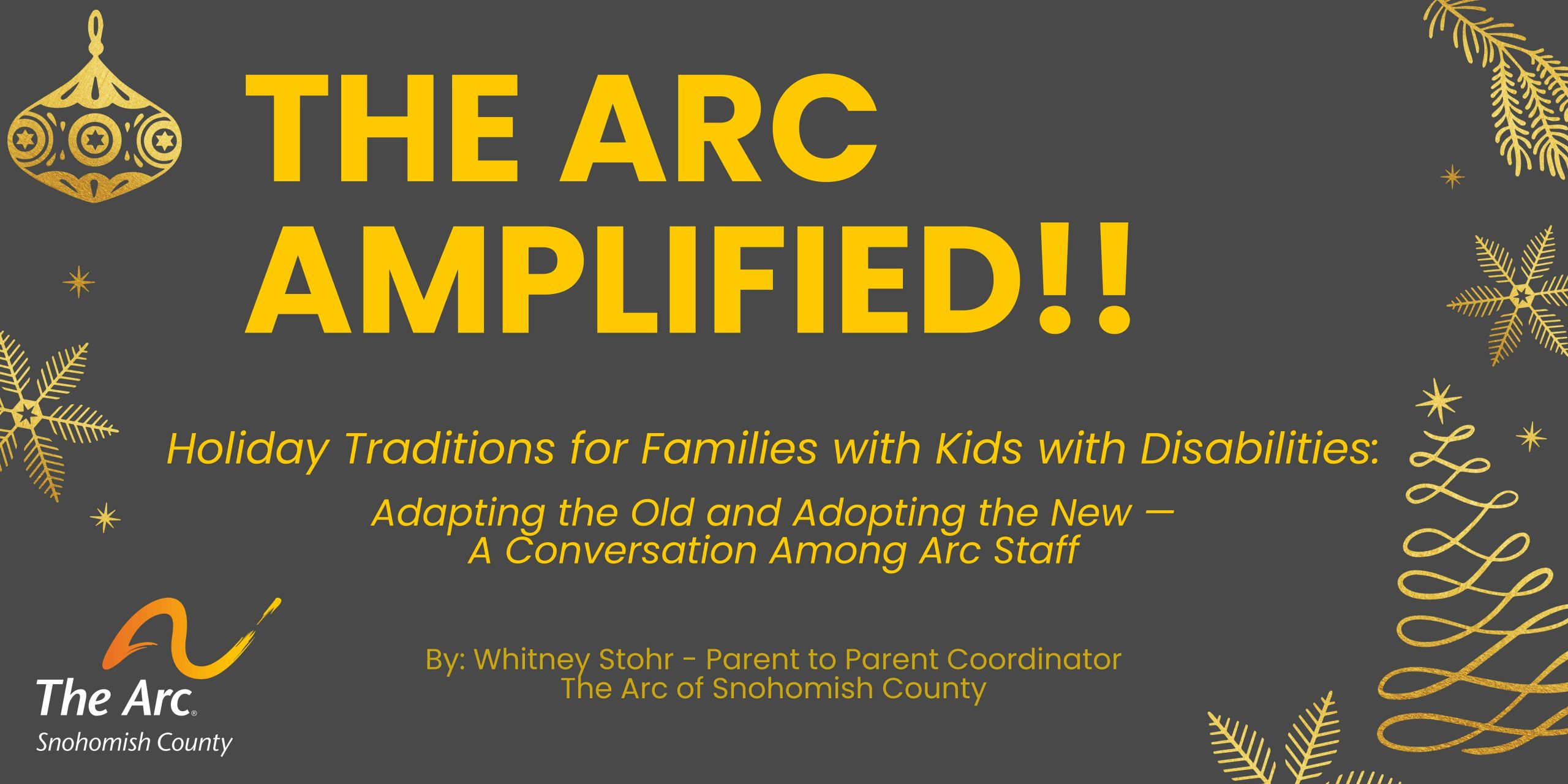
Holiday Traditions for Families with Kids with Disabilities:
Adapting the Old and Adopting the New — A Conversation among Arc Staff
Near the beginning of this holiday season, a colleague reached out with the suggestion for a blog post on holiday traditions and how traditions can change when your child, or another family member, has a disability. She shared how parents of kids with disabilities can feel pressure during this time of year to join in “traditional” holiday events, even when they are not a good fit for their family. (It really was a good idea for a blog post. Thanks, Courtney Criss. I appreciate you!)
This idea prompted my own thinking, too, about traditions — those that have changed due to my son’s disability and those we had once hoped to begin, but never did for the same reason. Honestly, I try my hardest during the holiday season not to think too much about traditions. The Christmas season has always been my favorite time of year. I love everything about the extended time between Halloween and New Year’s, and it still hurts to consider the traditions our family has missed.
A few days after having this conversation with my colleague, I was in a meeting with parent-caregiver collaborators and an ice-breaker question was posed: “What is your favorite holiday tradition with your kids?”
Oy….
Here is my honest answer: I do not have one.
I do not have a single, favorite holiday tradition, or really, any long-standing tradition with my son because we have not had time to create them. My son was born in early 2018, and we spent the first two years of his life in and out of the hospital. He was too weak and prone to illness to engage in much of anything during those early years. Then, right as he was growing into stability, and my husband and I began to look outward again at the world, the pandemic hit with full force. We turned around, walked right back into isolation, and haven’t left yet.
So, regarding the question of holiday traditions: Admittedly, I carry some grief on this topic. I grieve the traditions that I once hoped to start with my family. I grieve the time that was lost during those first holiday seasons, as we bounced from medical appointment to medical appointment, and otherwise lived in a bubble to limit early exposure to the type of cold viruses that would surely land us in intensive care. And, like much of the world, I grieve the loss of the past two years when nothing has been the same and, perhaps, never will be quite the same. That grief continues…
But, certainly, if this topic of traditions was weighing on the mind of my colleague, who is also the mother of young children, and if a question about favorite holiday traditions hit my emotional core like a ton of bricks… then, certainly, this is a topic that must impact others within our larger community of parent- and family-caregivers.
I posed these questions to our staff here at The Arc of Snohomish County:
How have you changed or adapted “traditional” holiday events because a member of your family has a disability? Are there any new traditions you have created specifically to accommodate your family’s needs?
The answers centered on a few main points.
First: Ambient modifications; that is, altering the environment, or the setting, of holiday celebrations to be more inclusive to all family members. For Luz Cobián, Hispanic Outreach Coordinator, this meant playing softer music during festivities. Teri McKeehan, Community Connections Coordinator, shared how her family began hosting festive events at their home with smaller groups of people, who understood their needs and could celebrate alongside their family.
Second: Rethinking event attendance; meaning, thinking ahead about how it might be possible to attend holiday events and family gatherings, while having a contingency plan in place if anything changes. Teri shared again how, when attending holiday gatherings, her family would take two cars, so one parent could leave early with their daughter, if needed. Courtney Criss, Independent Living and Housing Coordinator, shared how difficult large gatherings can be for her son, who has a disability. Her family will sometimes attend events separately. Her daughters enjoy visiting downtown Seattle or Snowflake Lane in Bellevue, but these events are harder on her son. For this reason, she is searching for opportunities to establish smaller, more intimate, traditions with the entire family.
Third: Giving up traditions. This is a hard one, and yet, coming to know that it is time to give up a long-held or deeply meaningful tradition is not uncommon among families of kids with disabilities and complex medical needs. You can see it when something you once enjoyed as a family now brings only stress and anxiety. It is easy to try to hold on to these traditions; to will them into being at any cost…. And then, the day comes when forcing a tradition that no longer works for your family is simply not worth the toll it takes on your mental health. For me, giving up old traditions was the most difficult part of becoming a Medical Mom. For my family, this meant ending our holiday celebrations at my parents’ home on the Oregon Coast. The coastline is simply too far from the type of emergency medical care my son may need, and the idea of making that trip generates more anxiety than excitement. It was hard to let go of that tradition, and it is okay that it was hard.
Fourth: Finding new traditions that work for everyone in the family. This was a shared goal among staff members. Many talked about their tradition of driving around to look at Christmas lights. This is always a winning idea because you are in charge of everything — the route and the drive-time — and you can simply go home when the fun ends. Courtney shared how her family of six will drive their van around in search of “Christmas houses” while listening to carols and drinking peppermint milkshakes. (Yum!)
Staff also shared traditions they built around their kids’ interests. Nicki Solie, Special Education Coordinator, puts her son in charge of decorating the family Christmas tree with *all* the colors! He also sets up her Christmas village each year, and the family rides the monorail to visit the mall and the train display at Seattle Center.
Luz talked about her “proud mama moments” when family members recognize the ways in which her son can participate in family activities.
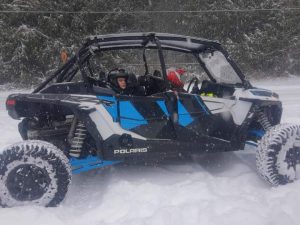 Jessie Moore, Leadership Development Coordinator, shared how her family spends time outdoors each winter, building snow people, making snow angels, sledding and cruising around in their off-road buggy. Each year, they take on a special “holiday project,” and as a family, they also enjoy The Lights of Christmas event in Stanwood.
Jessie Moore, Leadership Development Coordinator, shared how her family spends time outdoors each winter, building snow people, making snow angels, sledding and cruising around in their off-road buggy. Each year, they take on a special “holiday project,” and as a family, they also enjoy The Lights of Christmas event in Stanwood.
My family is still working on building traditions, but we are getting there. During these past two years in pandemic isolation, my family has visited a tree farm to cut down a real Christmas tree that we decorate with homemade ornaments. My son opens an Advent Calendar filled with toy trinkets, and on St. Nicholas Day, Santa stops by for a visit outdoors. While these experiences are still new to us, I feel like we are, at least, planting the seeds of tradition. I hope that is the case.
Without question, the holiday season can elicit many complex emotions. This is true, of course, not only for family caregivers, but for every person, who may experience both joy and grief; glee tinged with feelings of melancholy; hope and disappointment — all existing simultaneously. And, it is even more challenging when you yearn to establish family traditions, but your family dynamic makes many of the typical, holiday traditions… just… unworkable.
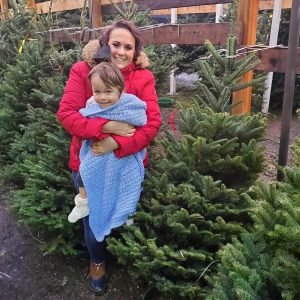 This is hard stuff.
This is hard stuff.
It is hard to abandon your favorite traditions — especially if they were passed down through generations of family.
It is hard to always think ahead and to spend time creating elaborate plans of action that will allow your family to attend basic, holiday events… (“Maybe. If everything goes just right. Or not. We’ll wait and see.” Right?! If you know, you know.)
And, it is REALLY hard when you watch other families *not* have to do these things. They can attend a church cookie exchange party without making a situation specific, emergency plan. What?! They probably do not call ahead to a hotel to ask the desk clerk about the emergency response time from the nearest fire station. Do concerns about sensory overload or wheelchair accessibility ever cross their minds? I do not know….
Yes, the holidays can be hard for parents and family caregivers of children with disabilities. If you are one of those caregivers: Please know that you are not alone in those feelings. You are, in fact, in quite good company, if I do say so myself. (And I do say so!)
So, what can we do?
 Celebrate the wins — If you find something that works for your family, build it into a tradition. Create new traditions that work for your family. It is not required that traditions be passed down through generations. Every tradition began somewhere!
Celebrate the wins — If you find something that works for your family, build it into a tradition. Create new traditions that work for your family. It is not required that traditions be passed down through generations. Every tradition began somewhere!
Engage your kids in ways that work for them — Anything can be a tradition! If your child has a specific interest, or loves one particular thing about the holiday season, grasp onto it and cultivate that interest. Find ways to celebrate the holidays by amplifying interests that are already there.
Keep trying — If something does not work, move on. It is okay if your BRILLIANT attempt at creating a last memory falls flat. Keep trying. It really is the “try” that matters.
And remember: You are doing awesome. You are doing your best. Your family sees that.
However you celebrate… Whatever traditions you hold… I wish you a wonderful holiday and a hope-filled, winter season.
**********
Whitney Stohr is a Parent to Parent Coordinator at The Arc of Snohomish County. She is passionate about advocating for medically complex children and children with disabilities and their families. She is a mom and medical caregiver herself, who is energized by working closely with other parent/family caregivers. She lives with her three-year-old son Malachi and husband Jason in Lynnwood. Connect with her online at whitney@arcsno.org.
Family Fun, Holiday Activities for Under $25 – Ice-Skating
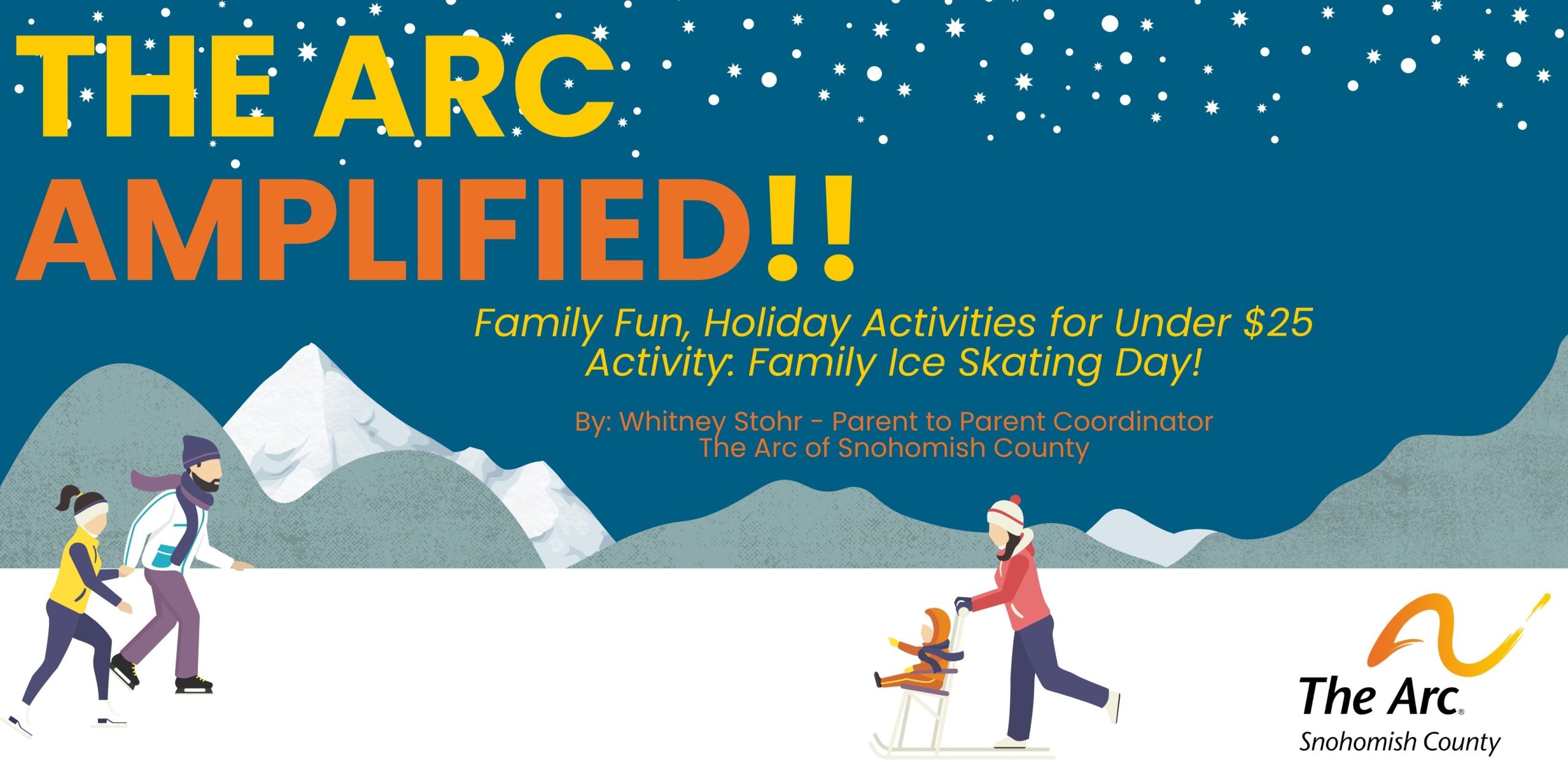
Family Fun, Holiday Activities for Under $25 — A Series
Activity: Family Ice-Skating Day
Whether you are a novice skater, or a parent (or grandparent) skating pro, who is totally hyped to bring back the skills of your teen years, time on the ice is a fun way to spend an afternoon with the family!
 Ice arenas can be welcoming and inclusive spaces. For new skaters, or those who are more unsteady on blades, many ice arenas offer supportive skating frames. Those who use other types of mobility devices, including wheelchairs, can join the fun! There are entire leagues for sled-hockey, and there is no reason that your child (or yourself!) should feel left out from skating. (Though, if you are unsure about the accessibility of a facility, I always recommend calling ahead to ask clarifying questions.)
Ice arenas can be welcoming and inclusive spaces. For new skaters, or those who are more unsteady on blades, many ice arenas offer supportive skating frames. Those who use other types of mobility devices, including wheelchairs, can join the fun! There are entire leagues for sled-hockey, and there is no reason that your child (or yourself!) should feel left out from skating. (Though, if you are unsure about the accessibility of a facility, I always recommend calling ahead to ask clarifying questions.)
From one highly COVID-conscious family to another: On the spectrum of “COVID-safe” activities, ice-skating may rank among the more safe of winter traditions. Ice arenas are large and crowds are continuously moving over the ice. There is not a lot of opportunity for people to congregate in groups while moving. Masks are still required, and the rule is generally enforced. You can also opt for outdoor skating if the idea of indoor recreation gives you the heebie-jeebies. To further ease your anxiety about crowded check-in lines and spectator bleachers, check the facility schedules for open-skate sessions during off-hours — during school hours or weekday mornings, if your family schedule allows.
(Pausing here to send a virtual hug and high-five to all the high-risk families out there feeling cut-off from the rest of the community. My family is there, too, and it can feel incredibly isolating at times. This has been a long, scary, almost-two years. Please know that you are not alone — not by a long shot — and many of us are still with you in isolation — living apart, but together in spirit.)
Looking for a good place to GET YOUR SKATE ON?! While an afternoon skate session can become quite pricey, depending on the number of skaters in the family, there are a handful of arenas in the greater Seattle area that offer more affordable and discounted session rates. Check out the list below.
Puget Sound Ice Skating Arenas with Affordable Rates & Discounts
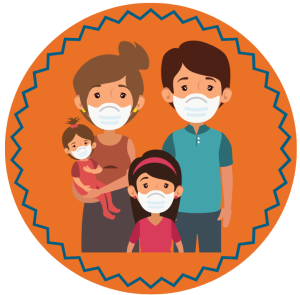 Note: Please remember to bring a mask to wear at ice skating facilities at all times. Masks are one important way we can protect the health of our friends and neighbors and everyone around us.
Note: Please remember to bring a mask to wear at ice skating facilities at all times. Masks are one important way we can protect the health of our friends and neighbors and everyone around us.
Add Some Extra Fun
Want to make your day of fun on the ice a little more special? Try these ideas:
- Dress up! Santa hats, ugly sweaters or funky, knee-high socks — All of it makes for even better photos!
- Warm up after your skate-sesh! Stop at a local coffee shop on your way home for a cup of delicious hot chocolate or cider.
- Play a game of car karaoke! Take turns selecting your favorite holiday song and performing it for your car-mates. If you are a family lacking in stage fright, set up that live social media feed and broadcast your car-concert to everyone you know. Now, THAT makes for an interesting ride home!
Note: When researching activities within the stated $25 limit, costs were considered based on family participation of 1-2 adults and 2-3 children (i.e. a 2- to 5-person household). The actual cost of activities will vary based on the number of people in the family, as well as their ages and individual needs.
**********
Whitney Stohr is a Parent to Parent Coordinator at The Arc of Snohomish County. She is passionate about advocating for medically complex children and children with disabilities and their families. She is a mom and medical caregiver herself, who is energized by working closely with other parent/family caregivers. She lives with her three-year-old son Malachi and husband Jason in Lynnwood. Connect with her online at whitney@arcsno.org.
A Holiday Shopping Guide for Medical Families & Parent Caregivers

A Holiday Shopping Guide for Medical Families & Parent Caregivers
Part 2 — For Caregivers
And… we are back with PART 2 of our 2021 holiday gift guide, developed with medical families, kids with disabilities and parent caregivers in mind.
This part of our gift guide focuses specifically on gifts for caregivers! We are talking about gift items that the moms, dads, kinship and all other family caregivers out there are sure to enjoy this holiday season. There are also ideas for families who have in-home nursing or respite support.
(If you are still in need of gift ideas for the kids in the family, check out PART 1 of the gift guide. It was previously posted on our blog at tinyurl.com/2s4be43e.)
TO: MOMS & MOM-FIGURES
- A Quality Pair of New Shoes
Can we get a round of applause for arch supports?! Seriously, though… mom-caregivers are non-stop! The role they play in the family often means that they are on their feet. All. The. Time. And boy, can that make the old dogs bark! A new pair of quality shoes with good arch and ankle supports may be the perfect gift for the always-busy, mom-caregiver. Dansko and Berkenstock clogs are popular brands among family caregivers, as are traditional running/walking shoes.
- Certificate for Housekeeping Service
Between medical management, personal care tasks, appointment scheduling, phone calls with doctors, and errands to pick up medications and other items… and all of that on top of any outside-the-home job… It is no wonder many caregivers feel like they are constantly running behind on basic house cleaning! A gift certificate for a good, deep cleaning service would be appreciated!
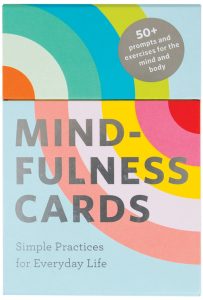 Mindfulness Cards
Mindfulness Cards
With all that there is to accomplish during the day, it is natural for parent-caregivers to feel exhausted, overwhelmed and anxious. Mindfulness practice strategies can help family caregivers clear their minds of stress and reestablish calm breathing. A simple pack of mindfulness cards or a journal can support the emotional wellbeing of mom-caregivers and encourage them to take a moment for self-care.
- “Mom Coupons”
One gift moms always appreciate from their young kids are cute, handmade “coupons” entitling them to “One at-home manicure” or “One time cooking dinner” or some other home task. They are both thoughtful and adorable! (Shoutout to Alaina Kube, Parent to Parent Coordinator, for this suggestion!)
- Electric Mug Warmer
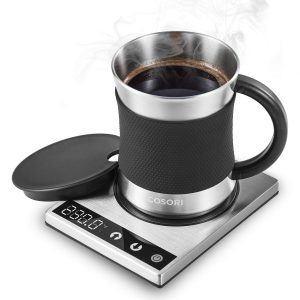 There is a quip that goes: “How to Make Iced Coffee: 1. Have kids. 2. Make coffee. 3. Forget you made it. 4. Drink it cold.” It is both funny and true. That is why an electric mug warmer would be a much appreciated gift for the mom-caregiver you know and love.
There is a quip that goes: “How to Make Iced Coffee: 1. Have kids. 2. Make coffee. 3. Forget you made it. 4. Drink it cold.” It is both funny and true. That is why an electric mug warmer would be a much appreciated gift for the mom-caregiver you know and love.
- Salon Day Gift Certificate
Parent-caregivers understand the struggle of carving out time in their schedules to take care of themselves. But, taking time for self-care and respite is important! Sometimes, even a simple haircut can make you feel completely rejuvenated. This holiday season, encourage mom-caregivers to take time for themselves with a gift certificate to their favorite, local salon.
- A Standing Coffee Date
Schedule a year’s worth of coffee dates with your mom-caregiver friend. She may appreciate having a reason to get out of the house and spend an hour of adult time with a friend each month. Three cheers for that special mom-to-mom time with your girls! Amiright?!
TO: DADS & FATHER-FIGURES
- Gift Certificate for “Maker” Classes or Workshops
A gift certificate for a “Maker” Workshop can make a great gift for dad-caregivers who like to tinker or make things with their hands. The SnoCo Makers is a group of local hobbyists and people interested in creating. They have a MakerSpace workshop in Everett. Not quite ready for in-person meet-ups? No problem! There are countless opportunities to get involved in maker workshops online.
- Comfy Loungewear
When it comes to home-based caregiving, comfort is key! When shopping for a dad-caregiver, consider gifting him some comfy sweatpants or other loungewear. In addition to comfort-level, look for a quick-drying material in dark colors, because… you know — kids.
- Quality, Dad-Kid Time
Giving a dad-caregiver some special, quality time with his child is a wonderful gift. Create a “day out” package for the duo with a gift certificate for lunch and a movie, bowling or some other fun activity you know they will both enjoy.
- A Good Pair of Slippers
Who doesn’t love a good pair of comfortable slippers?! Of course, there are many options available for purchase online, but a pair with thick rubber soles provides dad-caregivers the extra traction they may need to respond to a busy toddler or an unexpected medical situation.
 Stainless Steel Syringe Set
Stainless Steel Syringe Set
For dad-caregivers of kids with feeding tubes, a fancy, stainless steel syringe or two can make a great gift. These are more environmentally friendly than your typical plastic syringes, can be cleaned and reused countless times, and free you from the worry of running short on your monthly allotment of feeding supplies.
- A Relaxing Massage
Caregiving can take a significant, physical toll on the body. Every caregiver needs time to relax and work out the kinks.
- A New “Go-Bag”
It is common practice for families of kids with serious medical diagnoses to keep a “go-bag” backpack with emergency medical supplies, medication lists and personal items for overnight hospital stays near the front door of their homes, or in the back seat of their cars. Having a medical bag handy can be life-saving! Giving a dad-caregiver a nice, new duffle bag or backpack to replace an old and well-used one is a thoughtful (not to mention, practical) gift. When shopping for go-bags, keep color in mind — consider family preference, but also the importance of the go-bag being readily identifiable by emergency personnel. (My family has an oversized, red backpack that we use as a go-bag.) Also, for many families, a rule of thumb is: the more pockets, the better!
*Shoutout to Medical Dad Jason Hendrickson for some of these ideas!
TO: NURSE CAREGIVERS & HOME-HEALTH AIDES
- Personalized Ornament
If your caregiver is someone who celebrates the Christmas holiday, the wide world of the internet offers many ornament options. There are ornaments for both home health-aides and nurses (and just about every other health professional you know!). If you order soon, you may have just enough time to have the ornament personalized with their name and still arrive before December 25th.
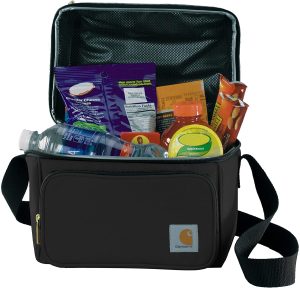 Cute, Insulated Lunch Bag
Cute, Insulated Lunch Bag
In-home caregivers may pull long, ten- or twelve-hour shifts in your home. While they may place their lunch in the family refrigerator, a nice, insulated lunch box still makes a great gift.
- A “Jar of Thanks”
This is a fun gift you can work on with your kids. Purchase a large, gallon-sized jar and a pack of cute notecards. Take time thinking about the times you were especially thankful to have your caregiver in your life. Write a short story on each card and place it in the jar. If you are feeling extra thankful, try writing a card of thanks for each day of the coming year.
- A Meaningful Mug
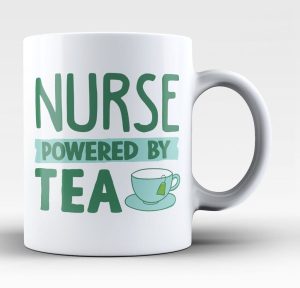 For the caregiver who runs on coffee or tea, consider a warm beverage mug with a cute quote or meaningful print. Fill with tasty chocolates or hot cocoa packets and a candy cane for an extra dose of sweetness.
For the caregiver who runs on coffee or tea, consider a warm beverage mug with a cute quote or meaningful print. Fill with tasty chocolates or hot cocoa packets and a candy cane for an extra dose of sweetness.
- Something Unique, Sentimental or Handmade
There is nothing quite as touching as a gift given from the heart. If you are someone with a special skill (like quilting or knitting), then you have the ability to make the caregiver in your life a truly unique and one-of-a-kind gift. Another option for families who have grown exceptionally close with their in-home caregiver is to create a special scrapbook with family memories and photos that include the caregiver, or simply print one really special photo of your child and that caregiver and have it framed as a gift.
Happy holidays to everyone! Wherever you are, and however you celebrate, may this season bring a sense of calm and peace; joy, hope and light.
**********
Whitney Stohr is a Parent to Parent Coordinator at The Arc of Snohomish County. She is passionate about advocating for medically complex children and children with disabilities and their families. She is a mom and medical caregiver herself, who is energized by working closely with other parent/family caregivers. She lives with her three-year-old son Malachi and husband Jason in Lynnwood. Connect with her online at whitney@arcsno.org.
Fun, Family, Holiday Activities for Under $25

Fun, Family, Holiday Activities for Under $25 — A Series
Activity: Hot Chocolate Bar
What you need:
- Hot Chocolate
Prices will vary depending on your preferred brand and type of hot chocolate. A simple 8-packet box of Swiss Miss Hot Chocolate mix costs $2-3.
- Marshmallows
A bag of regular mini marshmallows costs around $2, depending on where you shop. Marshmallow loving families may opt for the jumbo puffs, and those on a vegetarian/vegan diet can look for gelatin free options (or make your own!)
- Candy Canes
A 12-pack of the traditional, red-and-white (peppermint) candy canes costs about $3, and you can often find them on sale at local grocery stores. You may opt for candy canes of different colors or flavors, or instead, choose a box of peppermint sticks or other minty candies.
- Chocolate Chips
A bag of semi-sweet chocolate chips will cost about $4. Alternatives might include white chocolate chips, butterscotch chips or Andes chocolate mints.
- Whipped Cream
A spray can of Reddi-wip whipped cream also costs about $4.
- Sauces
A drizzling sauce over cool whipped cream adds something special to a mug of hot chocolate. Fan-fav flavors include dark chocolate, white chocolate and caramel sauce. One bottle of good drizzling sauce can cost around $4.
- Sprinkles
Top off your mug with your choice of sprinkles. A small bottle of the popular rainbow sprinkles will cost $2-3. There are many other options that can bring color and good fun to your Hot Chocolate Bar, including winter and Christmas themed sprinkles.
Other topping options include: Cinnamon sticks, course sea salt, toasted coconut, toffee bits, fruit jams or syrups, espresso powder, chili powder or puppy chow!
Prepare for fun!
1. Create your Hot Chocolate Bar! Spread it out on the kitchen table and tell the kids to go to town. (Mom, dad or a big sibling can serve as the “official hot milk pourer”)
2. Turn on a holiday movie, grab a winter themed puzzle, or just sit around the kitchen table together and enjoy the company (and the chocolate!)
3. Go back for seconds… and thirds…
**********
Whitney Stohr is a Parent to Parent Coordinator at The Arc of Snohomish County. She is passionate about advocating for medically complex children and children with disabilities and their families. She is a mom and medical caregiver herself, who is energized by working closely with other parent/family caregivers. She lives with her three-year-old son Malachi and husband Jason in Lynnwood. Connect with her online at whitney@arcsno.org.
A Holiday Shopping Guide for Medical Families & Parent Caregivers

A Holiday Shopping Guide for Medical Families & Parent Caregivers
The holiday season is here!
For those who have already completed their holiday shopping — congratulations! You are my personal inspiration.
For those of us, who were going about our regular business a few days ago, looked at the calendar and realized it was already December 1st… This one is for you! (You are amongst friends here!)
And, of course, for the in-betweeners: Those still looking for the “perfect” gift for that one amazing, family member — This is for you too!
I have compiled a list of gift options for everyone in the family.
This list — Part 1 — is all about the kids (including our adult kids)!
TO: OUR A-MAZING KIDS
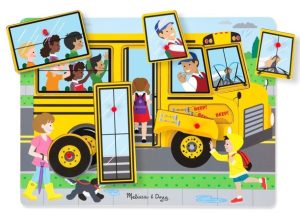 Sound Block Puzzles
Sound Block Puzzles
These block puzzles have knobs of varying sizes and a noise or song that plays when the puzzle piece is correctly matched. Puzzles are fantastic developmental tools, and the knobbed grips can support the adaptive needs of your child with a disability.
- Cool, Adaptive Shoes
For kids who require extra shoe support or shoes that can stretch around AFO/orthotics, a cool pair of new shoes could be a hit. Billy Shoes are a great option for people of all ages who wear orthotics. They’re made right here in Washington and are now available for purchase at Target.
- Weighted Blankets
They are comfortable and calming. This is the perfect gift for anyone who loves the feeling of being snuggled up and wrapped tightly. Weighted blankets are soothing and may help promote deep sleep.
- Adaptive Art Supplies
Is there a budding artist in your midst? Maybe coloring and drawing are among your child’s IEP goals… Or, perhaps you have seen how art therapy benefits your child. Adaptive art supplies make fantastic gift items (and stocking stuffers!) for both little hands and hands that benefit from the added support of the adaptive design. Options include adaptive paint brushes, painting kits, color crayons, and more!
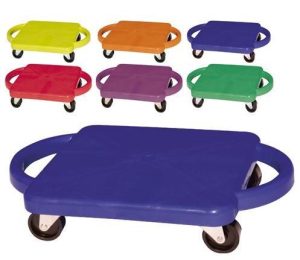 Plastic Scooter Boards
Plastic Scooter Boards
The parents out there may remember these scooter boards from PE class in elementary school. They are loads of fun and just so happen to be a physical therapy tool in disguise. Scooter boards can help build gross motor skills and develop body coordination in multiple positions.
- Indoor Mini Trampoline
Mini trampolines are a fun gift for all the high-energy kids out there! The best part: They are built to be indoors, which means — hello! — an ideal, rainy-day activity! Many different options are available, including those with balance bars for added stability.
- Cube Chairs
Best suited for your preschool-sized kids, cube chairs are colorful, moveable, stackable seating options. They are low to the ground and light-weight, durable and easy to clean. A chair can be flipped on its side and used as a table. These are highly adaptable for household use, and provide solid back and trunk support for kids.
- Sensory Swing
Sensory swings have long been used as therapy tools and are now widely available for home use. Swings can help develop core strength and stability. They provide vestibular input and are just… FUN! There are different style options out there, so shop around to find the best fit for your child.
TO: THE SUPER SIBS
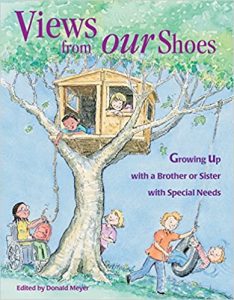 Books by Sibshops
Books by Sibshops
Sibshops is a national program offering support for the siblings of children with disabilities. (The Arc of Snohomish County offers Sibshops for both the 8-12 and 13-18 age ranges. Visit our monthly calendar of events to register your child to attend an upcoming Sibshop.) The organization behind the national Sibshops program has published several books on what it means to be a “Sib” and all of the joys, challenges, fears and triumphs that exist alongside their sibling status. Order the books online at siblingsupport.org.
- Monthly Outings of the Sib’s Choosing with Just Mom or Dad
Give your child the gift of time this year. Set a standing date on the calendar each month that is reserved for just you and your child. Spend the afternoon together and let them guide the activity. That focused time together is a gift for the both of you.
- Overnight Trip
If you have the ability to get away for the night, give your child the gift of a fun-filled, overnight stay with either mom or dad — or both of you, if possible! Plan something that is of specific interest to your child. Take them to their favorite restaurant and pack a board game or puzzle for that evening at the hotel. Often, it is those special experiences that create a lasting memory.
 Personalized Adventure List
Personalized Adventure List
An “adventure” or “challenge” to-do list that includes various activities, games and sightseeing ventures is a gift that lives on past the holiday season. These to-do lists can present opportunities to carve out time for your child and you to check-off tasks, either individually in a parent-child pair, or as a whole family. While lists and books are available for purchase online, it can be fun to create a personalized list that honors your child’s interests and hobbies, as well as your family’s needs.
- Hobby Gift
Has your child shown a special interest in a particular hobby over the past year? Do you share a special interest with your child? If so, consider a gift that might cultivate that interest, and — perhaps — is something you can do together. If you are a musician, maybe your child would like to take up an instrument so that you can play together. A gift of personalized baking supplies may lead to the two of you spending more time together in the kitchen. Are there complex LEGO sets that call for a combined parent-child effort? Hobby gifts can naturally create special moments to spend extra time together.
TO: OUR ADULT KIDS
- 2022 Activity Planner
Is there any better time than now to set someone up for success in the New Year?! For those who still prefer a low-tech, paper-based calendar, the gift of a high-quality planner may be just the right choice. There are seemingly endless options out there, so consider what set-up might best suit your child’s daily life. Planners keep us all on track and are a daily exercise for our time management and executive functioning skills.
 Adult Coloring Books
Adult Coloring Books
Coloring books are fun for all ages! An adult coloring book and a simple set of colored pencils can provide a nice distraction during long wait times in doctor’s offices or during bus commutes to and from work. And it easily fits in a purse or backpack!
- Fitness Pass
A punch pass or monthly membership to a gym or other exercise class is a wonderful gift for those who are active and interested in such programs. For those who require adaptive support, the YMCA of Snohomish County offers inclusive programs in dance, yoga and other activities.
- Items for Organization
Organizational tubs and storage boxes are always helpful gift items — especially for those who have recently moved or are planning a deep Spring-Clean in the New Year. Perhaps a stand-alone, bathroom cabinet or shoes racks are needed. A large, magnetic, refrigerator calendar or a tabletop, erasable white board are also solid gifts to help keep our lives, our homes and our schedules as organized as possible.
- Join a Team Together
Is there a special activity, hobby or sport that you and your adult child both enjoy? This holiday season, consider paying league dues or the entry fee for two people. Invite your child to join you for cooking classes, a bowling league or a book club.
TO: THE WHOLE FAMILY
- Museum or Zoo Memberships
The gift of a family membership is, literally, one that keeps on giving all year long. Family memberships, such as those by Imagine Children’s Museum or Woodland Park Zoo, allow for endless family fun and many memorable outings.
 Family Kites
Family Kites
Let’s go fly a kite! Well, maybe, let’s make plans to fly a kite once the spring flowers bloom…. Still, how exciting for the kids to each unwrap their own bright, colorful kite this holiday season! It makes it easy to imagine many beautiful, sunny days spent with family at the park. (Check out this article for information on some of the best kite-flying hills around the Seattle area: tinyurl.com/ycks2us9)
- Day Trip Adventure by Train
Plan a short family excursion by train! Even if your destination is a place you have visited many times, the journey along the rails offers a fresh perspective and a new experience. For the holidays, give each kid an envelope that contains a homemade train ticket with your destination depot and information on activities that you plan to do upon arrival. (Here are five day-trip options by train: tinyurl.com/2p8bfehw)
- Sleds and a Trip to the Mountains
Tis’ the season! With a family gift of new sleds, make a plan to get outside and embrace the beauty of the Cascades! The great thing about sleds is that there are options that meet the needs of different family members. A saucer sled may be the right fit for the daredevil of the family, while a toboggan with a high backrest can provide the additional trunk support that another family member needs to fully enjoy their time on the mountain. (Check out this list of nearby sledding hills: tinyurl.com/4etw8czw)
*** Stay tuned for Part 2 of the Holiday Gift Guide with ideas to honor the parent and family caregivers you know and love!
**********
Whitney Stohr is a Parent to Parent Coordinator at The Arc of Snohomish County. She is passionate about advocating for medically complex children and children with disabilities and their families. She is a mom and medical caregiver herself, who is energized by working closely with other parent/family caregivers. She lives with her three-year-old son Malachi and husband Jason in Lynnwood. Connect with her online at whitney@arcsno.org.
Trauma Informed Resource Guide
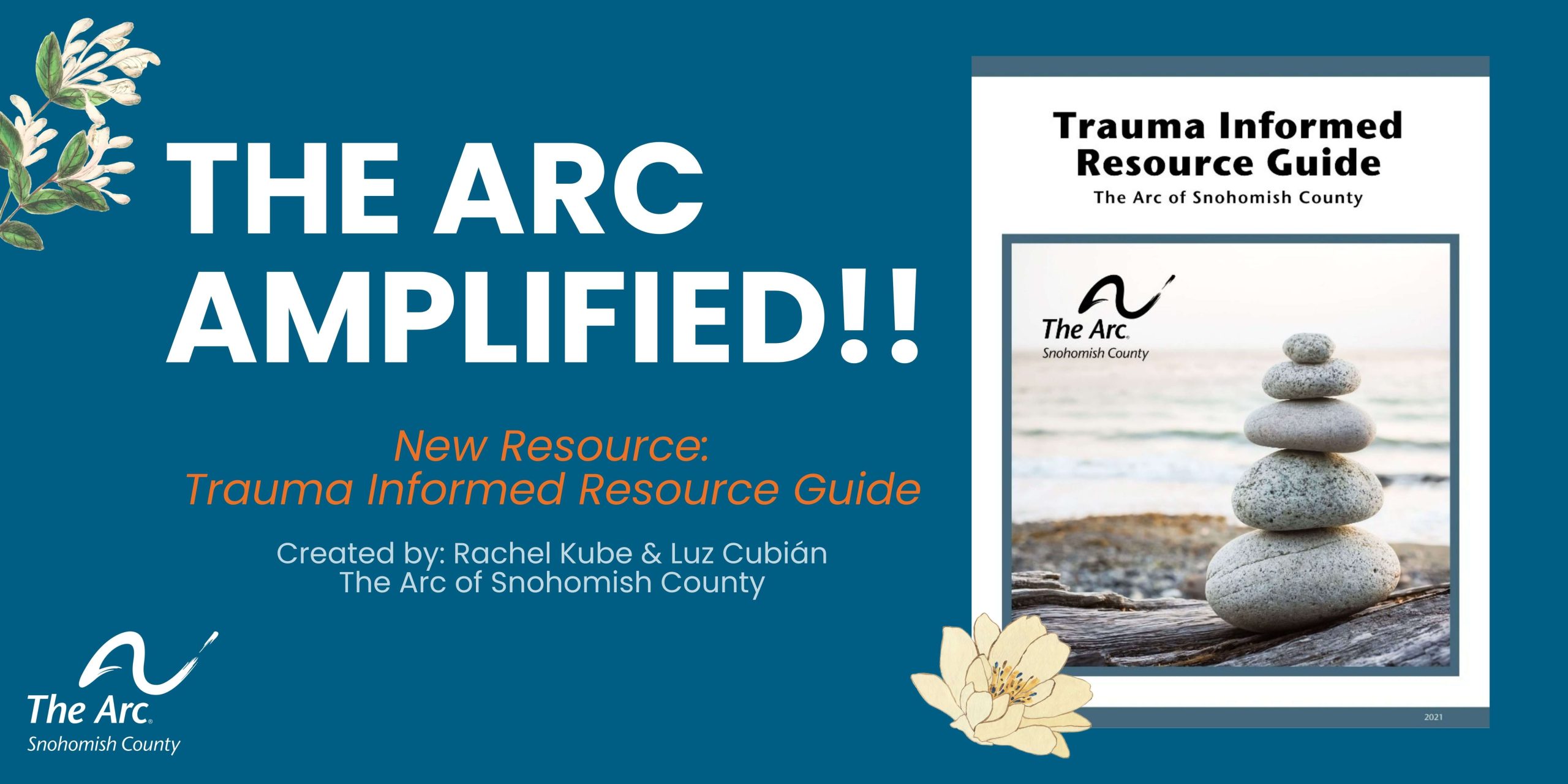
New Resource: Trauma Informed Resource Guide
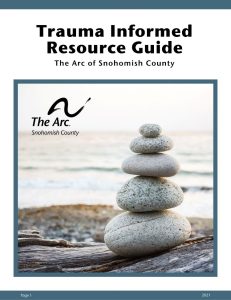 The Arc of Snohomish County recently released a new, public resource — a 2021 Trauma Informed Resource Guide — to support individuals, children and families impacted by trauma and to provide information and tools for professionals to approach their work through a trauma-informed lens.
The Arc of Snohomish County recently released a new, public resource — a 2021 Trauma Informed Resource Guide — to support individuals, children and families impacted by trauma and to provide information and tools for professionals to approach their work through a trauma-informed lens.
The guide includes information on trauma, trauma-based responses and trauma-informed care. There are also links to helpful information and tools on self-care, mindfulness, kindness and resilience. The guide includes resources available in both English and Spanish.
CLICK HERE to download the complete now updated 2022 Trauma Informed Resource Guide.
Note: This resource guide was researched and created by The Arc of Snohomish County staff members Rachel Kube and Luz Cobián. The intended purpose of this guide is to list an array of online resources related to trauma informed approaches. Inclusion or exclusion of material does not reflect endorsement.
The Importance of Parent-Caregiver Connections
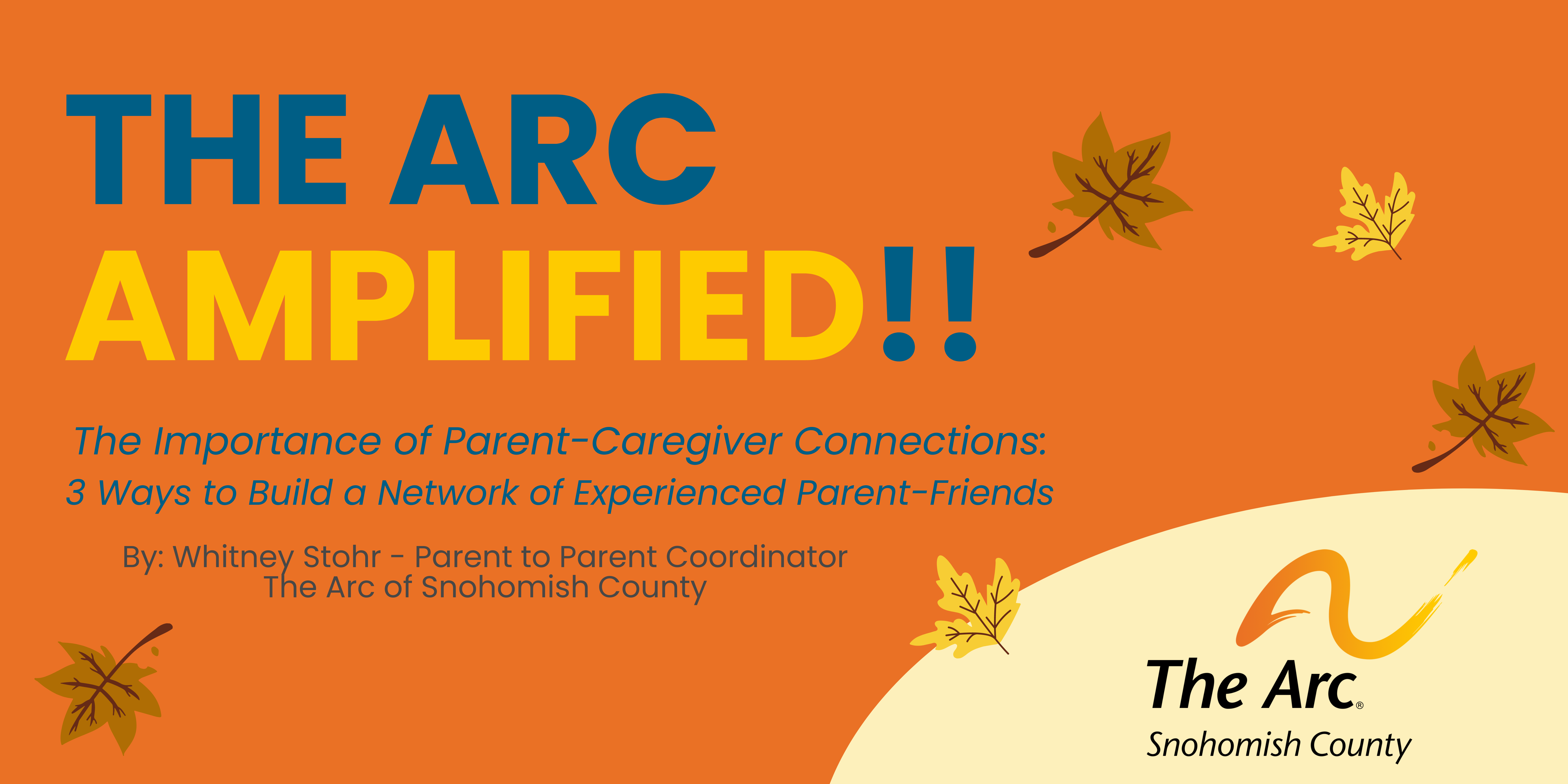
The Importance of Parent-Caregiver Connections:
3 Ways to Build a Network of Experienced Parent-Friends
Who do you turn to during times of high stress?
Who do you call when you need advice? Who is there to listen?
Who is there when your childcare falls through, or you need an overnight bag dropped off at the hospital?
Who will sit with you in the quiet after a particularly hard day of caregiving?
The value of these listening-ears, these hand-holders and these drop-everything-and-pick-your-kids-up-from-school-because-you-just-caught-a-ride-in-the-back-of-an-ambulence-with-your-toddler people cannot be overstated. These are your support people. This is the network of people we build up around ourselves. We rely on each other.
All parents can benefit from a well-established, supportive network of family, friends and/or community members. However, as parents of children with disabilities, we also need other medical families and caregivers in our lives.
We need people who understand our day-to-day routines because they, too, are living something similar. We need people who share the lived experience of caregiving and hospital stays, stress, anxiety, and feelings of isolation. We need people who have an informed perspective, who are available for the occasional rant, a good ugly cry, or to talk through new ideas for respite and care options. We need people who also spend hours navigating disability systems, sitting through IEP meetings and chauffeuring their kids back and forth to physical therapy and doctor’s appointments like other families do ballet and soccer practice.
We need those people in our lives. In addition to other family members, long-time friends, helpful colleagues, and loving members of our church and school communities, we need parent-caregiver friends.
But, how do you find these people?
Where do you connect with other family caregivers so that you can build these relationships?
1. Community Events & Activities
There are many different activities and community programs that support children with disabilities and their families. Seek out these opportunities to connect by searching for them online or asking around at your child’s school. There are Special Education-focused, parent-teacher groups in some school districts that create an easy opportunity to connect with other parent-caregivers. Other local nonprofit organizations host online events and meet-ups for diagnosis-specific communities. (Here is a list of local programs and services supporting individuals with disabilities and their families: tinyurl.com/yckyauak.)
2. Go Virtual
The power of technology means that individuals and small groups, once disconnected due to geographic distance, now have the ability to coalesce and build community online. There are countless parent pages and discussion groups on Facebook geared toward every type of disability. Searching via hashtags for other parent-caregivers on Instagram allows for more direct, personal connections. Twitter provides an ideal platform for quick conversations and information sharing. (Search for targeted conversations, such as those using #FamilyCaregiver or #DisabilityTwitter, to join the discussion) The podcast network has also expanded to include a number of terrific channels that focus specifically on caregiving issues and what it is like to raise a child with a disability. Guests on these podcasts will often share resources and ideas for how to connect with other parent-caregivers and medical families. (Check out the award-winning, Puget Sound-based podcast “Once Upon a Gene,” by parent-caregiver Effie Parks.)
Whatever the platform, the important thing is to engage! Share information, say “hello!” to other users, and comment on their posts. These platforms are all about building connections!
3. Caregiver Support Groups
The Arc of Snohomish County offers several parent-caregiver support groups that provide parents space to find support, share their hopes and fears and everyday challenges, and swap information about local resources. There are also groups for family caregivers of adults with disabilities and for sibling caregivers. (More information below!) Other organizations may offer diagnosis-specific groups, or groups based on some other shared experience such as language, ethnic background or religious/spiritual practice.
The Arc of Snohomish County — Caregiver Support Groups:
- Mother’s Network: For moms raising children with developmental disabilities. Meets monthly on the 1st Saturday, 10 am – 12 Noon.
- Father’s Network: For dads and male caregivers raising children with developmental disabilities. Meets twice monthly on the 2nd and 4th Thursdays, 7 – 9 pm.
- Padres Unidos: A Spanish-language support group for parents raising children with developmental disabilities. Meets on Fridays, 10 – 11 am
- Miercoles de Mamas Cocina y Manualidades: A Spanish-language support groups for moms raising children with developmental disabilities. Meets monthly on the 2nd Wednesday, 7 – 8 pm.
- Adult Caregiver Support Group: For the parents of adult children with developmental disabilities. Meets monthly on the 3rd Wednesday, 11 am – 12:30 pm.
- Washington State Adult Sibling Meetup: For siblings of adults with developmental disabilities. Meets monthly on the 3rd Thursday, 4 – 5 pm.
Visit our calendar of events for more information or to register to attend an upcoming support group meeting: arcsno.org/calendar.
**********
Whitney Stohr is a Parent to Parent Coordinator at The Arc of Snohomish County. She is passionate about advocating for medically complex children and children with disabilities and their families. She is a mom and medical caregiver herself, who is energized by working closely with other parent/family caregivers. She lives with her three-year-old son Malachi and husband Jason in Lynnwood. Connect with her online at whitney@arcsno.org.
Giving Tuesday – The gift of community
November 20th: National Family Volunteer Day
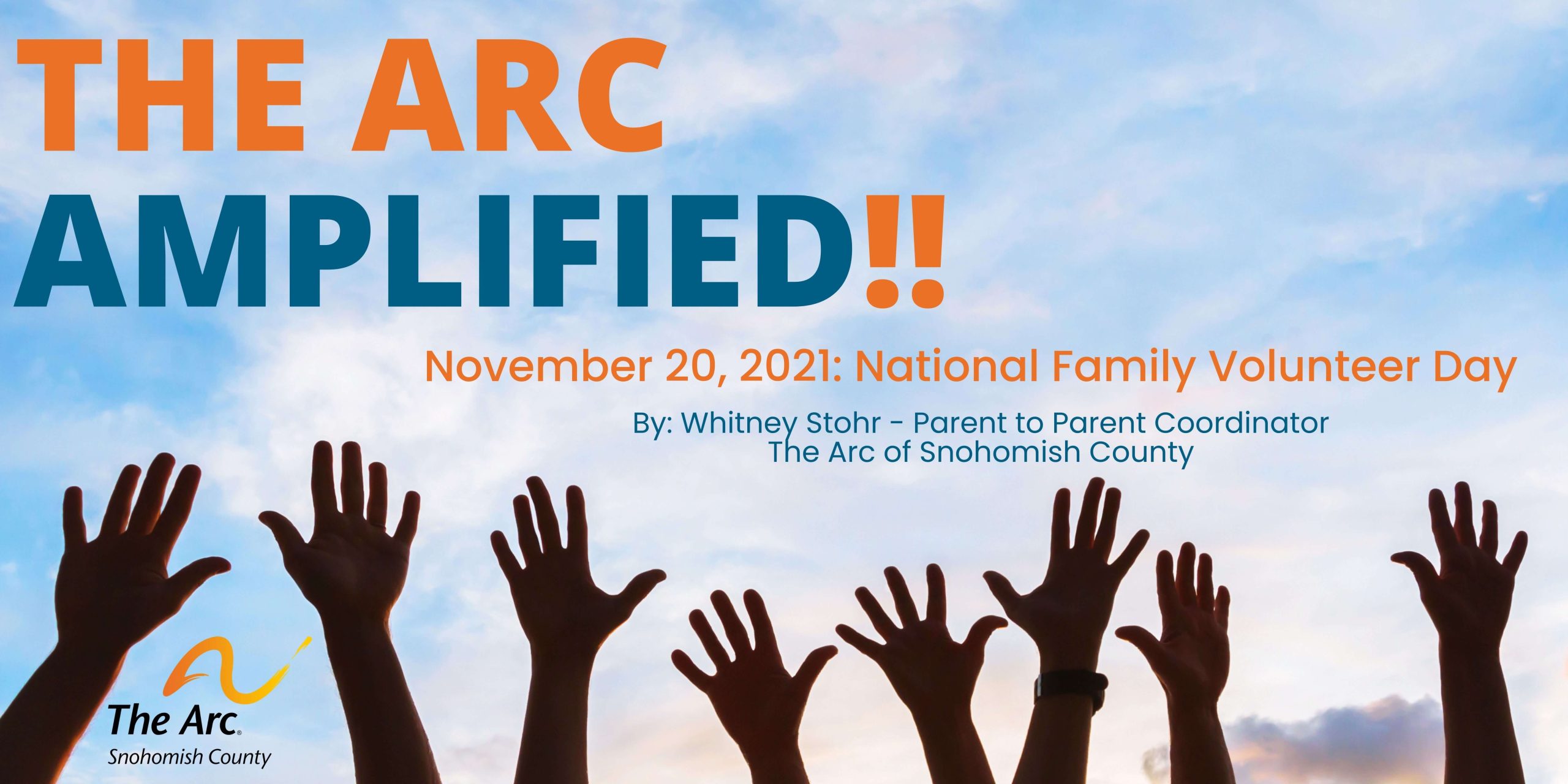
November 20th is National Family Volunteer Day!
Volunteering as a family is an excellent way to be present and involved in the community, spend time together, and teach young people about the importance of civic engagement and giving back to others.
Volunteering provides kids and teens with opportunities to explore various interests, learn new skills, consider future jobs, and support causes of budding importance to them. Volunteering also allows families to self-direct their community involvement toward projects and programs that they know, through research, are the best fit for their needs, interests and passions.
There are many ways to volunteer together as a family!
You can volunteer as part of a larger group supporting a one-time activity or project; or, you can commit to regular service, such as on a weekly or monthly basis. For example, perhaps you can accompany your animal-loving child to the Everett Animal Shelter to walk adoptable dogs and spend some quality time together. As a family, you might select one day each month for volunteering to sort, pack and distribute food donations at the Snohomish Community Food Bank or Edmonds Food Bank. The ladies in the family might enjoy spending time together, giving back and learning new skills at a Women Build event supporting Habitat for Humanity of Snohomish County. With the holidays right around the corner, the Marysville Community Food Bank is seeking volunteers to support the annual, on-site Toy Store.
While it is convenient to join in an organized event or establish a regular volunteer schedule with a local nonprofit, giving back to the community does not require such formality. Your family can create their own ways to volunteer together!
Points of Light is the world’s largest organization dedicated to volunteer service. The Points of Light website is set up to help connect community members with volunteer service opportunities. In addition, the website includes an Open Resource library of Do-It-Yourself Volunteer Projects that can be adapted and implemented in your neighborhood and wider community. This DIY project page includes such ideas as a “Photojournalism for Good” project, supporting local refugee communities, and creating “birthday boxes” to donate. Learn more at pointsoflight.org.
**********
About National Family Volunteer Day:
- Family Volunteer Day — Points of Light
- 5 Benefits of Volunteering as a Family — Points of Light
- Benefits of Family Volunteerism — Volunteer Logistics
- Inclusive Volunteering — The Arc U.S.
More Resources for Community Volunteering:
- Find a Volunteer Opportunity — Points of Light
- Western Washington Volunteer Opportunities — Volunteers of America
- Snohomish County Parks Volunteer & Service — Snohomish County
- Library Volunteers — Sno-Isle Libraries
**********
Whitney Stohr is a Parent to Parent Coordinator at The Arc of Snohomish County. She is passionate about advocating for medically complex children and children with disabilities and their families. She is a mom and medical caregiver herself, who is energized by working closely with other parent/family caregivers. She lives with her three-year-old son Malachi and husband Jason in Lynnwood. Connect with her online at whitney@arcsno.org.
Taking Life by the (MINI Cooper) Wheel

Taking Life by the (MINI Cooper) Wheel
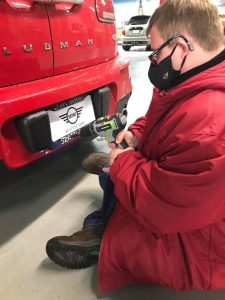 Austin, age 22, recently began his first paid job at Mini-Cooper of Seattle. After graduating from Lake Stevens High School in 2017, he entered the Lake Stevens transition program. He then volunteered at the Salvation Army food bank for two days a week. Now, Austin works one 8-hour shift each week at Mini-Cooper and carpools with his boss who lives in the same town. His many responsibilities include washing, drying, vacuuming and detailing cars. He is making friends with his coworkers; one bought him lunch last week.
Austin, age 22, recently began his first paid job at Mini-Cooper of Seattle. After graduating from Lake Stevens High School in 2017, he entered the Lake Stevens transition program. He then volunteered at the Salvation Army food bank for two days a week. Now, Austin works one 8-hour shift each week at Mini-Cooper and carpools with his boss who lives in the same town. His many responsibilities include washing, drying, vacuuming and detailing cars. He is making friends with his coworkers; one bought him lunch last week.
When he’s not working, Austin keeps busy by taking classes at the Alyssa Burnett Center. His vehicle maintenance class is expanding his skill set to include installing snow chains and changing oil and tires. He also participates in Life Group through Eagle Wings Ministry. Another interesting fun fact about Austin is that he has amassed a collection of 350 key fobs.
If you purchase a new car at Seattle Mini-Cooper, it might have been detailed by Austin!
**********
Contact:
Courtney Criss, Independent Living Coordinator – The Arc of Snohomish County
courtney@arcsno.org | 425-258-2459 ext. 113
Learn more about Snohomish County employment resources take a look at Career Path Services


